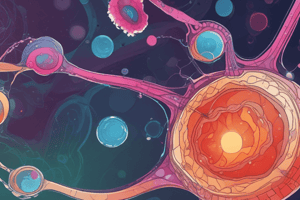Podcast
Questions and Answers
What is the primary function of the nuclear envelope?
What is the primary function of the nuclear envelope?
- To regulate the passage of substances in and out of the nucleus (correct)
- To synthesize proteins
- To produce energy for the cell
- To store nutrients
Which process describes the movement of water across a semi-permeable membrane?
Which process describes the movement of water across a semi-permeable membrane?
- Active transport
- Osmosis (correct)
- Facilitated diffusion
- Diffusion
Which of the following is NOT a function of organelles in eukaryotic cells?
Which of the following is NOT a function of organelles in eukaryotic cells?
- Synthesizing proteins
- Breaking down waste materials
- Regulating genetic expression (correct)
- Generating energy
What role do chromosomes play during cell division?
What role do chromosomes play during cell division?
Which statement is true regarding diffusion?
Which statement is true regarding diffusion?
Flashcards
Diffusion
Diffusion
Movement of molecules from high to low concentration.
Osmosis
Osmosis
Water diffusion across a membrane.
Nuclear Envelope
Nuclear Envelope
Double membrane around the nucleus, with pores.
Chromosome role
Chromosome role
Signup and view all the flashcards
Organelle function
Organelle function
Signup and view all the flashcards
Study Notes
Diffusion and Osmosis
- Diffusion is the movement of molecules from an area of high concentration to an area of low concentration.
- Osmosis is a specific type of diffusion; it's the movement of water across a semi-permeable membrane.
- Examples: sugar dissolving in water (diffusion), water moving into a cell (osmosis).
Nuclear Envelope
- The nuclear envelope is a double membrane surrounding the nucleus.
- It contains nuclear pores that control the passage of substances in and out of the nucleus.
- The nuclear envelope protects the genetic material by creating a controlled environment for DNA replication and transcription.
Chromosomes
- Chromosomes are DNA and protein structures carrying genetic information.
- They are crucial for cell division (ensuring accurate DNA copying and distribution to daughter cells).
- Chromosomes play a vital role in inheritance (determining traits passed from parents to offspring).
Organelles and Eukaryotic Cells
- Organelles perform specific functions essential to the overall functioning of eukaryotic cells.
- Mitochondria generate energy.
- Ribosomes synthesize proteins.
- Lysosomes break down waste products.
- All organelles work together to maintain cellular health.
Studying That Suits You
Use AI to generate personalized quizzes and flashcards to suit your learning preferences.
Description
Test your knowledge on key biological concepts including diffusion, osmosis, and the structure of eukaryotic cells. Explore the functions of organelles, the significance of chromosomes, and the protective role of the nuclear envelope. This quiz is perfect for biology students looking to reinforce their understanding of cell processes and structures.



